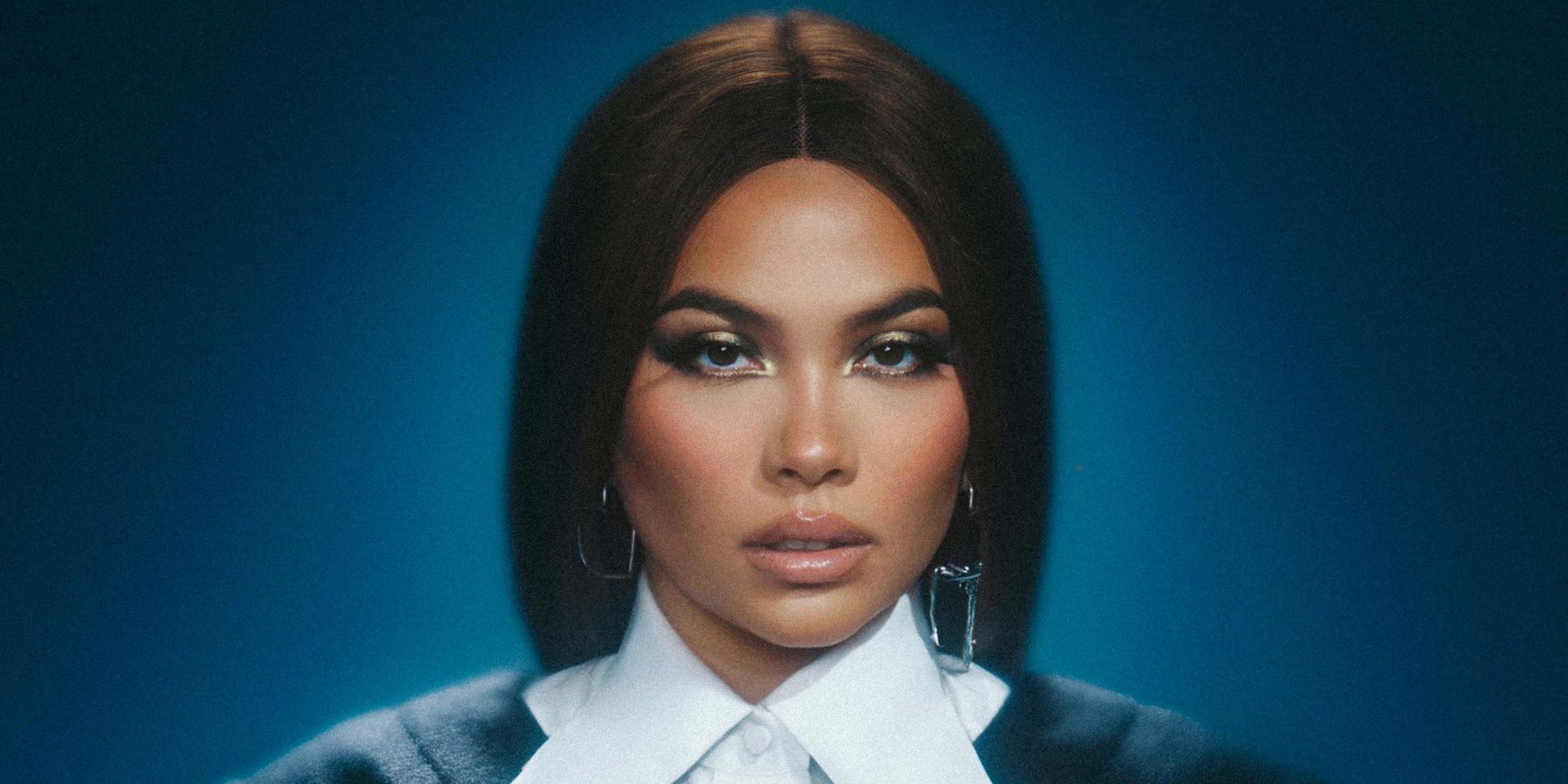
Music
Hayley Kiyoko Is Still Becoming Lesbian Jesus
Photography by Grace Scuitto / Story by Jade Gomez / Makeup by Marla Vazquez / Hair by Abraham Esparza / Styling by Heather Picchiottino
01 December 2022

Honorifics are used throughout pop culture to denote importance. From Michael Jackson and Madonna's famed titles as the respective King and Queen of Pop to Aaliyah's crown as the Princess of R&B, the roles set high bars for their wearers. Hayley Kiyoko, meanwhile, is still figuring out what it takes to step into the powerful role of Lesbian Jesus, a title placed upon her in 2018 that she does not take lightly.
Kiyoko's arresting gaze rests on whoever she's speaking to, giving the illusion that time has stopped. Her slight Californian twang can fill any room, and her laughter breaks down walls. Draped in the soft sunlight of her top-floor window, the 31-year-old pop singer greets me with a bare face and a smile, cozied up in a hoodie. Like most others, I was introduced to Kiyoko through her not-so-subtly queer-coded role as Velma Dinkley in Scooby-Doo! The Mystery Begins and her generation-defining role as Stella in the Disney Channel movie Lemonade Mouth.
Since the viral 2015 video for "Girls Like Girls," Kiyoko has found herself at the forefront of the generation she grew up in front of, most of whom navigated the troubling waters of identity and self in an unforgiving world. The singer, armed with magnetic charm and tenderness, extended her hand as a support system. Rather than utilizing the sickeningly sweet brand of positivity characterized by bumper sticker slogans and smiley faces or the hypersexual LGBTQ+ activism that can alienate many demographics, Kiyoko carved her own lane of outreach.
From 2015's This Side of Paradise EP through 2022's PANORAMA, the pop star leads heart-first. She tells tales of euphoric eye contact made with pretty girls over sparkling '80s synths and rehashes late-night encounters with moody R&B-inflected pop. She possesses the same natural storytelling instinct found inside locked diaries and layered whispers at sleepovers. It may be why she found a dedicated fanbase across all ages and identities, all of whom can resonate with her disarming honesty.
PANORAMA reasserts that Kiyoko is more than meets the eye. Despite gorgeous Instagram shots and a beautiful relationship with former Bachelor star Becca Tilley, which she confirmed earlier this year, she is still human. The singer unveils a rarely seen but very welcome snark on "sugar at the bottom" and sprinkles in her brand of lesbian love stories laced with taboo, tension and bliss. She also opens up about the mental health struggles amplified by the pandemic and isolation. However, Kiyoko isn't a hypocrite. She allows herself to be irrational, angry and unpleasant, knowing that there's a village of people ready to nurture her.
Much like the humanitarian inclinations of Jesus in classic Bible tales, Kiyoko is more than an actress, pop star or lesbian icon: She's a vessel of love and kindness, mirroring the fuel that has kept her going in even the darkest and loneliest of times.
Lesbian Jesus or not, Hayley Kiyoko has surely made her impact, and she's just getting started.
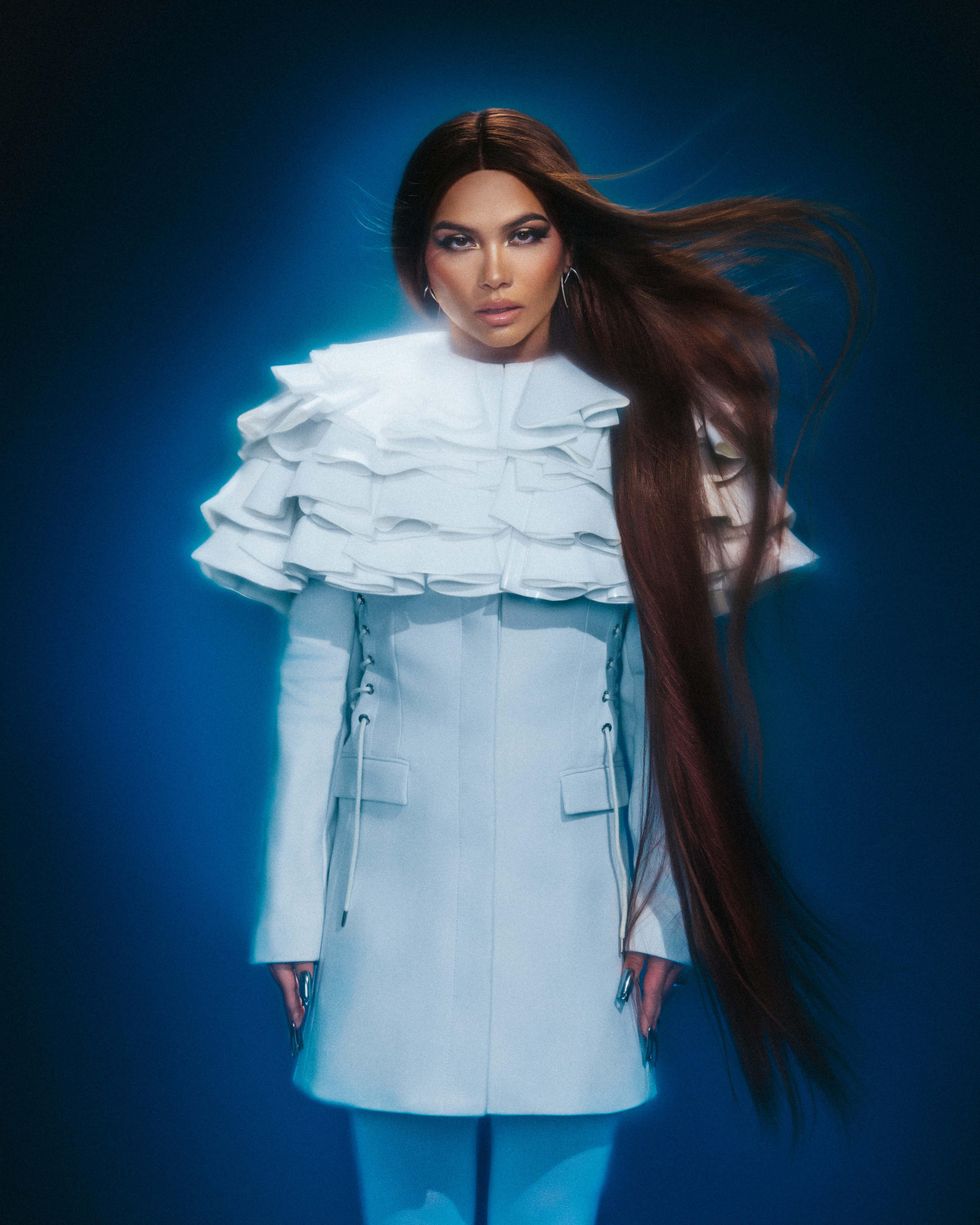
Dress: Dion Lee, Collar: Mikhael Kale, Earrings: Jack Eller, Tights: Wolford
Let's start with talking about the relationship you have with PANORAMA. It has been several months since it came out, and I'm talking to you after you've had time to let it sit. How has your relationship with it evolved over the past few months?
That's a great question. My relationship with the album just continues to blossom and grow. I am obsessed with PANORAMA. I loved playing it live. Like any artist that you'll speak to, I think that when you play the music and a new body of work live for the first time, it takes on a whole 'nother lifeform. For "deep in the woods," we did this amazing instrumental moment where it just feels like a wall of sound.
My relationship with the album has been such a positive one, and I feel so deeply connected to it in a different way because, for example, say you have a crystal or a bracelet that you love and cherish that you have gone through hell and back with and you wear it every day. You're just like, "I love this," but when you share it with someone else, they get to experience that and the relationship with the bracelet or item becomes so much bigger than yourself and your individual experiences. That's what it's like in the sense of being three, four months post-album. Also, so many people are still discovering it! It's been so exciting to approach this album cycle and let the album grow and let it find the people that need it most in an organic way.
You've been able to have a second coming with your audience who initially knew you from your acting and then rediscovered you as a musician. Your role as a vulnerable figure in the LGBTQ+ community must be very intense.
I'm just really grateful for my fans and my community. I'm a very sensitive person and therefore, I tend to put myself in very vulnerable situations time and time again. I definitely feel like the word "vulnerable" is attached to my name, for better or for worse. It's been a journey, and I'm still very much in the beginning stages of my journey. That's what was so incredible about this epiphany and the title, PANORAMA; realizing I obviously want to get to the top of this mountain, but I'm in this valley where I've lived and overcome so much.
There's such an incredible view to appreciate and enjoy now in my life and so I, as a perfectionist, get so fixated on the finish line and the end goal, and I love completing a task. I've been able to really allow myself to enjoy the ride more and appreciate the view, like the lyric, "Wait, have you seen the view?" It's been wonderful to get to share that with my fans. I do feel like we have a very special and deep bond, and we're very vulnerable. They're very kind to me and respectful. We're on this Earth together. This world is really challenging and society continues to try to tell us that we don't belong and that we need to fit in this box. And it's like, okay, but what if we don't?
It can be emotionally taxing to have that deep bond though. You seem to have done a good job of setting those boundaries and keeping some parts of your life private, however. How do you protect yourself?
It's a very delicate balance. You want to be open and available for people to get to share these moments and experiences because you're doing it together. But I think that the pandemic was a big eye-opener for me for self-care. Even on this past tour with Lauv, it was like, I'm doing these meet and greets and then after that, I have an hour where I'm just sitting in silence. Whether I want to sit in silence or not, I have an hour that I can just give to myself and kind of refuel and protect my energy as well. Because, listen, there's so many things that go on during a day and things go wrong, or, you know, you get bad news or you get a terrible text or phone call. Then, all of a sudden you have to be on stage and be emotionally available for people. It's just a balancing act, and it's trial and error. Most of my fans know when they are speaking to me at meet and greets and stuff, or if I bump into them, I get choked up. I get very emotional when they say anything kind because I'm just a ball of emotion.
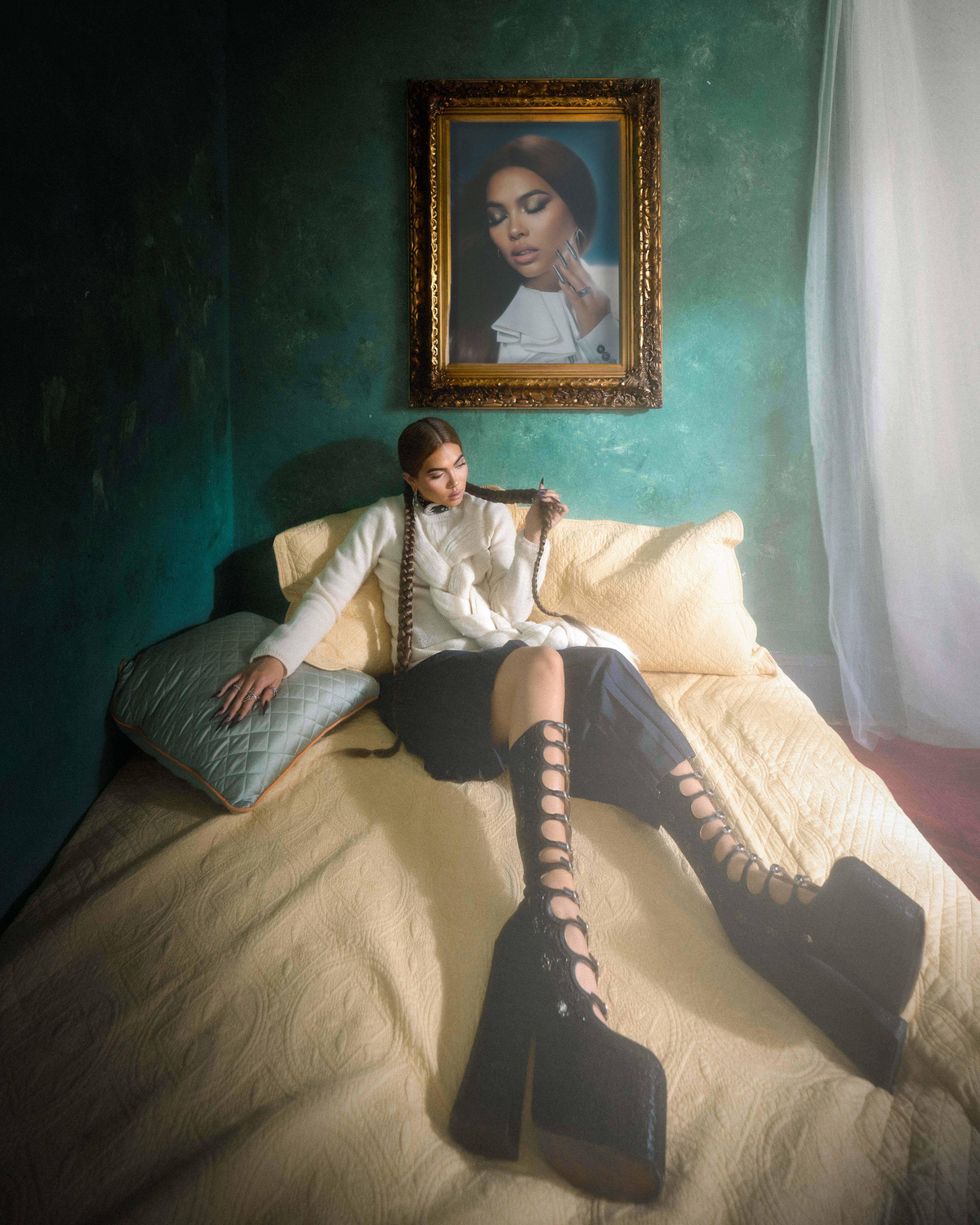
Sweater: COMME des GARÇONS, Shoes: Marc Jacobs, Skirt: Mikhael Kale, Choker: Zana Bayne, Earrings: Heaven by Marc Jacobs, Rings: Letra and Alexander McQueen
Yes! I remember this scary woman I went to church with as a child sat next to us one day. She never smiled. One day, I dropped this tiny toy I was playing with and couldn't find it. Halfway through the service, she tapped me on the shoulder and passed me the toy. I was too young to understand why I was moved to tears because of that moment.
You'll make me cry! It's so fascinating. Kindness goes such a long way and it can completely turn your day around. And it's important because life is really hard — the fact that she took the time to help you goes back to helping one another and supporting one another. It goes back to having a community being like, "Hey, it's okay," or "Hey, keep going," or "Hey, if things don't go your way, I'm gonna be there for you."
That's the support and community we all want. Whether we get that from family or not, we find it through our chosen family, our friends and strangers. It means a lot. I've been pursuing music since I was five, but being in this industry for over 15 years trying to chase my dreams, anyone who streams my song, anyone who shows up to a show, anyone that stops to say hi, it means the world. It gives me that boost to keep going.
Some folks really see you as synonymous with these other Disney stars around your age. What was that transition like as you got older?
Well, for clarity, it's so funny. A lot of people call me a Disney kid or Disney star when I was on like four episodes of Wizards of Waverly Place and I was in one movie on Disney! That was it! That was my whole experience, so the music element never really bled into that experience. Even though Lemonade Mouth had music, it was very separate. At that time in my music career, I didn't have a manager and I had just gotten out of or just started a girl group. I was just trying to find my way in the music industry. Obviously, the music industry has changed immensely. I mean, to become a star at that time, you would sing covers on YouTube and if it went viral, you might get signed. Or you had to sing, and then somebody scouts you. I would do open mic nights and hope that someone from the music industry would be in the audience to maybe get discovered.
Even at that time, I was struggling to find the right producers to record my music and actually have a physical copy of my music. It's changed a lot. It's also been the same in the sense that I've had to work really hard and do everything. It's a team effort, but I also have to do everything myself. If I have a vision and if I want to get something done, I have to actively figure it out on my own, because if I don't, no one else will. I've also had an incredible team that I've been able to find during that self-reliance journey, but it's hard because I was five and I wanted to be a pop star. And it's like, how do you do that? I've released PANORAMA, my sophomore album, and it's been so exciting. I'm also like, "Okay, how do I grow? How do I play stadiums? How do I get to that level of stardom that I've always dreamt of as a kid? And what does that look like? Do I want that?" There's always new sets of challenges, like any career and any dream.
Do you want that level of fame? What would that look like for you?
Oh, of course! I want to grow as an artist and I've always wanted to play in sold-out arenas and stadiums. I always just dreamt of being a pop star! And I think what's been fascinating about my journey is I've been so surprised by my passions, like directing my music videos out of necessity and realizing I love storytelling. Also in announcing my novel, Girls Like Girls, and writing the book. Finding all these different mediums of storytelling has been the biggest gift and surprise of my journey, because I was always like, "I want to be on stage! I want to be dancing! I want to have screaming girls!" But I had no idea that there was such a huge part of me that really wanted to tell stories. I really wanted to express myself and any facet that was available to me. That's been a really interesting journey as I continue to grow as an artist. Continuing my stories beyond just songs has been a really cool blessing and surprise in this whole adventure of becoming a pop star.
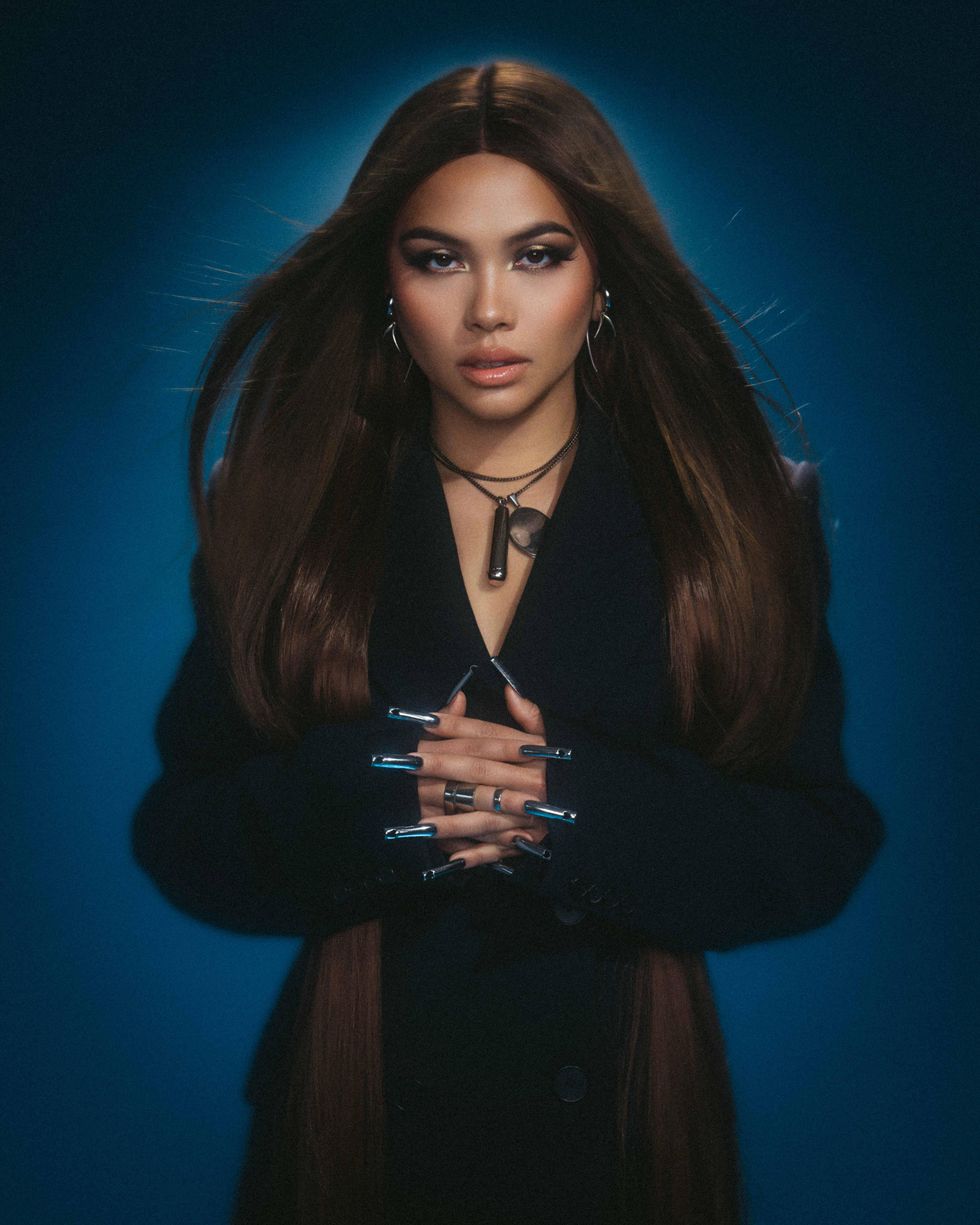
Clothing and accessories: Alexander McQueen
It's refreshing and surprising that you maintain a level of control and freedom in your vision even now that you're big. How important is that to you?
Creatively, I've always been very involved to the point of — in a positive way — being a micromanager. Looking back at my journey, I was always gonna do everything myself. Yes, I would have loved to have the directors that I dreamed of working with, or I would have loved to have this artist take me on tour. I would have loved to have the help and support that I was desperately searching for, but on the other side of the coin, I am who I am.
Going back to the band thing: no one joined my band. Therefore, I learned how to play guitar and learned how to play drums, I learned how to record my music. I am who I am because of all of these things and because of all these hardships and feeling like I'm on my own and really having to navigate a huge part of this journey and this industry on my own. I think that's why there's always a red thread with everything that I do because I'm literally doing it all and I'm never passing anything off to anyone. I'm sitting with my graphic designer doing the vinyl and picking the color and picking the gradient. When you get an item that's created or made with care and passion and love, you can feel that. I put my heart and soul into everything that I create, whether it's a song, a video or a book, I do my absolute best to really put my soul into that medium and hopefully have that be expressed.
Speaking of micromanaging, what was it like directing your girlfriend in the "For The Girls" video?
Becca knows when I have my work cap on, and then I take my work cap off and that's "play Hayley." She knows I'm very serious when it comes to work. She came on set and we had 15 queer contestants. It was gay chaos, and it was so fun. But we had one day to get this reality show music video shot. Everyone only had one or two takes because it was shot like reality, so we had a multi-camera setup, and I gave them the scene and they improvised.
So when Becca came on set — it was so funny because all she had to do was walk out of the limo. I had to give her three takes because she was like, "I gotta do it again!" I was like, "You literally can't." Three takes max, that's all you get. And then it was like 10 minutes. And then I was like, "Okay, moving on to the next scene!" It was pretty funny. I loved having her be part of it, and it was such a special moment for her and for myself to get to share our love with everyone.
But I don't know whether she's gonna want to be in another music video or not [laughs]. They look glamorous, but you literally have no time to get the shots. It's very chaotic.
It works though, because it added to the atmosphere of the video being a reality show.
Yeah, it was cameras and drama and fake fights. It was so fun. It was honestly one of my favorite videos I've directed because we just got to play all day and see where it was gonna take us.
One thing I appreciate about your artistry and your visuals is how much care you put into portraying intimacy in such a realistic way, whether it be the innocence in "Girls Like Girls" or the insanely hot "What I Need" video with Kehlani. I died!
I died too, honestly! I was like, "I can't believe this is real life right now!"
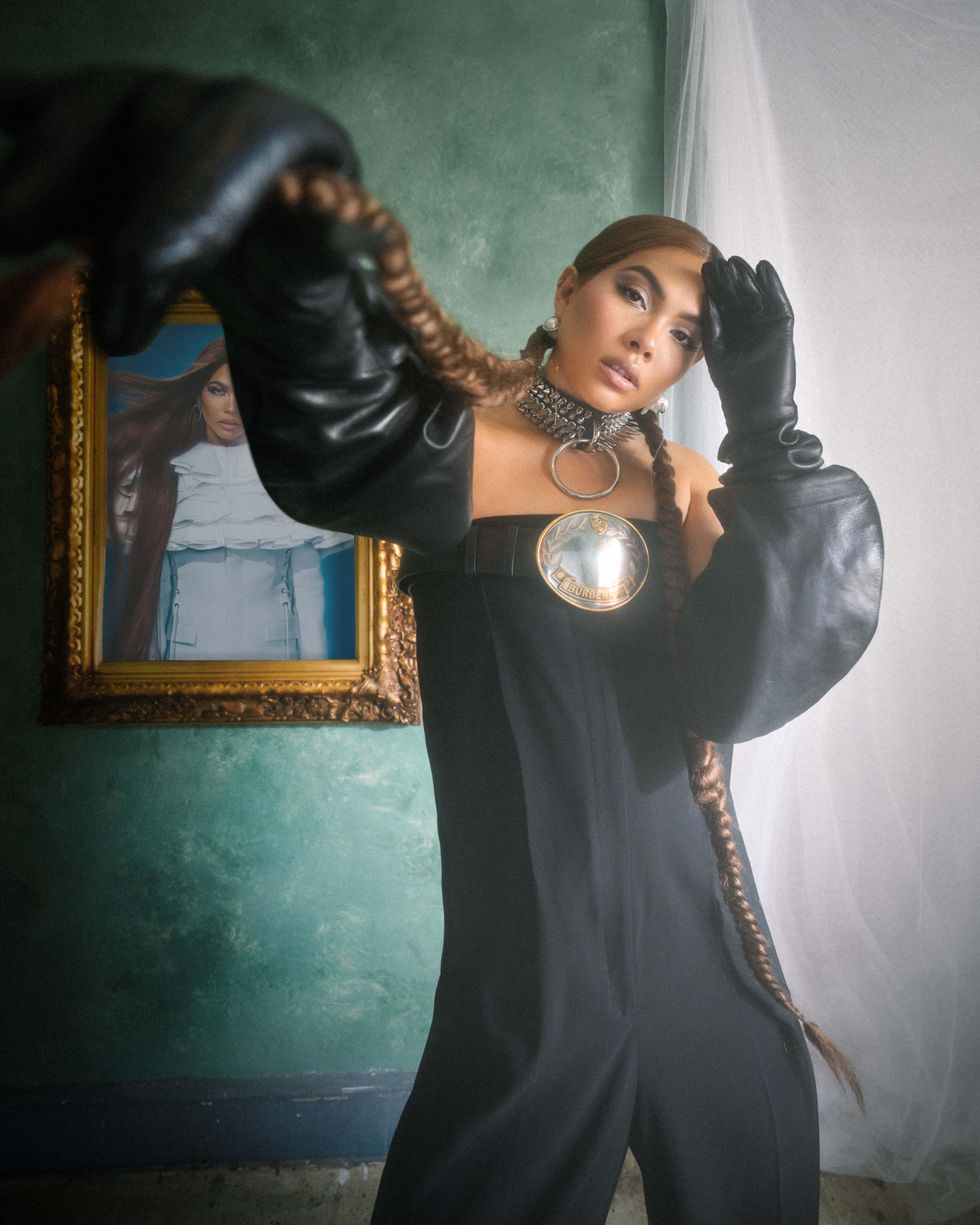
Jumpsuit and belt: Burberry, Choker: Zana Bayne, Gloves: Bottega Veneta, Earrings: Lillian Shalom
What is the intention that goes behind portraying sex and intimacy in that way?
Being a lesbian, I know what I know through experience and my feelings and emotions. So when I drop a music video that has a sexual scene, or you know, make-outs or whatever it is, it's coming from the heart. It's not coming from a fetish or fantasy, right? It's coming from my feelings and this yearning. I think that's where the authenticity comes from.
My goal in directing music videos was to get rid of the male gaze of lesbians, and over-sexualizing us in whatever we were in. I wanted to create music videos that were honest to me, but I also still wanted them to be sexy and hot! I never really overthought it. I just directed it and shot it the way I would want to see it and how I felt. I'm obviously a lesbian and a lot of times in our media and in the industry, even to this day, I could count on one hand how many queer, lesbian movies have been directed by queer women of color. So we grow up with a white man telling us what it looks like, or what it should look like. We're trying to change that and normalize same-sex relationships. It's honestly just coming from my heart.
I also love how you don't dilute the sexiness either. Sometimes when we think about this stuff removed from the male gaze, people think it has to be "sanitized."
Let's see some booty! As with anything, it's intention, right? It's the intention that you bring into your artistry and your approach. And so my intention is very different from a straight white man. That will always be different. My whole thing was I just felt like I didn't have representation. I didn't feel like I had a pop star that I could look up to that looked like me and felt the way I felt. I wanted that desperately because if I had that, I could maybe dream a little easier and believe in myself a little harder.
I'm glad you brought that up. I wrote something once about how Rina Sawayama allowed me, as an adult, to feel what I thought white girls felt when they saw the pop stars we grew up with. That representation is important to our upbringing. What was the closest thing you had to that representation growing up?
People ask me this question a lot and it's hard because I didn't have one person. I was inspired and influenced by many different artists because I didn't have that one person whom I was getting everything from.
So Gwen Stefani was one of my idols because she was just a tomboy and herself and cool. And I also loved that she had that business element. I love Stevie Wonder because of the stories that he told, and the visual elements of his lyrics were so fascinating to me. There were so many. I loved Britney, too. There were so many artists that I was inspired by, but it was little bits and pieces. Looking back at the people I used to listen to, I didn't have anyone that looked like me at all, except for Karen O. But that was missing for me.
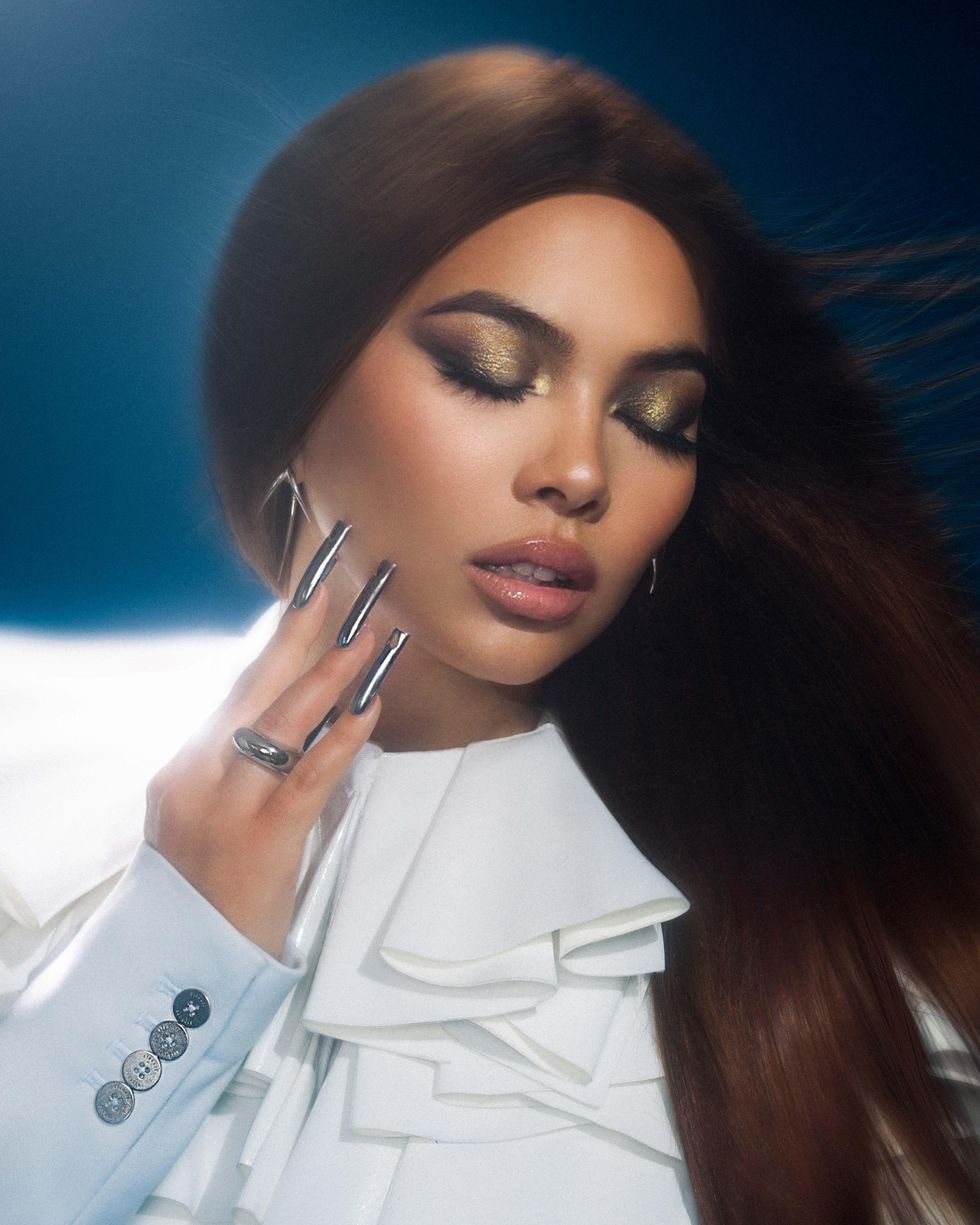
Dress: Dion Lee, Collar: Mikhael Kale, Earrings: Jack Eller, Tights: Wolford
A lot of growing up as a queer person of color or any intersection of these identities is learning to fill in the blanks for yourself. What blanks have you filled in?
One of the main things that I've discovered through therapy and conversations is that I didn't believe that I was worthy of being myself. When I went out for an audition for acting or something like that, I never saw myself. I was always seeing a white person. That was it. I never had space to actually be able to play that role, because I was just like, "Oh, that is not you. A pop star wanting girls to scream at you? That can't be you."
And so one thing that I've been cultivating is that I am worthy to be myself. I don't have to look like everyone else. And I think that in our minds, we go, "I really want to do this, but I don't look like that." It's been really about finding myself and cultivating the feeling that I'm enough for myself and knowing that I can be a pop star, I can be a lesbian, I can be half Japanese, I can be masculine, I can be all feminine and I can still be loved.
There's a line on "panorama" that I'd love to talk to you about. It's the opening lines: "I always panic 'cause I never have enough/ I wanna be more like the people that I love." What was your headspace like when writing this?
That song specifically is about trying to reconnect with myself. I was very depressed for a long time and I dealt with a lot of health issues that did not help my depression. There were moments where I felt very lost and separated from myself, like I could see myself away from myself and I'd be like, "I know who she is, I know where you are. How do I get to you?"
I had this moment when I played 2021 Pride where it was my first time performing back from the pandemic. I'd had a lot of health issues that were starting to get a little better, and I got on stage. It was a live stream thing, but I had this core group of friends that I obviously hadn't seen in a long time in the audience. And that moment, that feeling inspired "panorama," where I was just like, "Wow, you all have been there for me when I didn't believe in myself. You were all there waiting for me to find myself again, or a new version of myself. And you were patiently there for me knowing that eventually I would get there."
It was a really beautiful moment where I felt so appreciative of the life that I have and the view that I had because for so long, the view that I had was that I'm at the bottom of this mountain. I can't get up the mountain, I can't see down and I'm stuck. Where do I go from here? I can continue on my journey, I can still grow, I can still have hardships, I can still have lows, but I can also still celebrate myself. I can still give that to myself. Even the lyrics, "What's wrong with me? A lot of things," and navigating the fact that yeah, I have a lot of issues.
It hasn't been great. But also, I'm still here. Mental health is a big thing for me, too, and I just wanted to create a song that celebrated the fact that we can keep going and it's okay. I love that song too because sometimes when I get dark, I will play that song. It validates my hardships, but it also allows me to feel grateful at the same time.
I take it that you listen to your music a lot.
Oh yeah. I listen to "sugar at the bottom" when I need a confidence booster. I love listening to that song. I love listening to "underground" too. All of the songs on the album have really helped me heal and continue to reconnect with myself because I think a lot of us had so many hardships over the pandemic, feeling separated. And it's like, who am I? Where do I want to be? Where do I want to go? How do I want to live this life? How do I want to share my energy? Where do I want to put my energy? This album has been a gift to myself — to be able to listen to these songs and keep myself on track knowing that I'm headed to where I'm supposed to be. The journey is the destination.
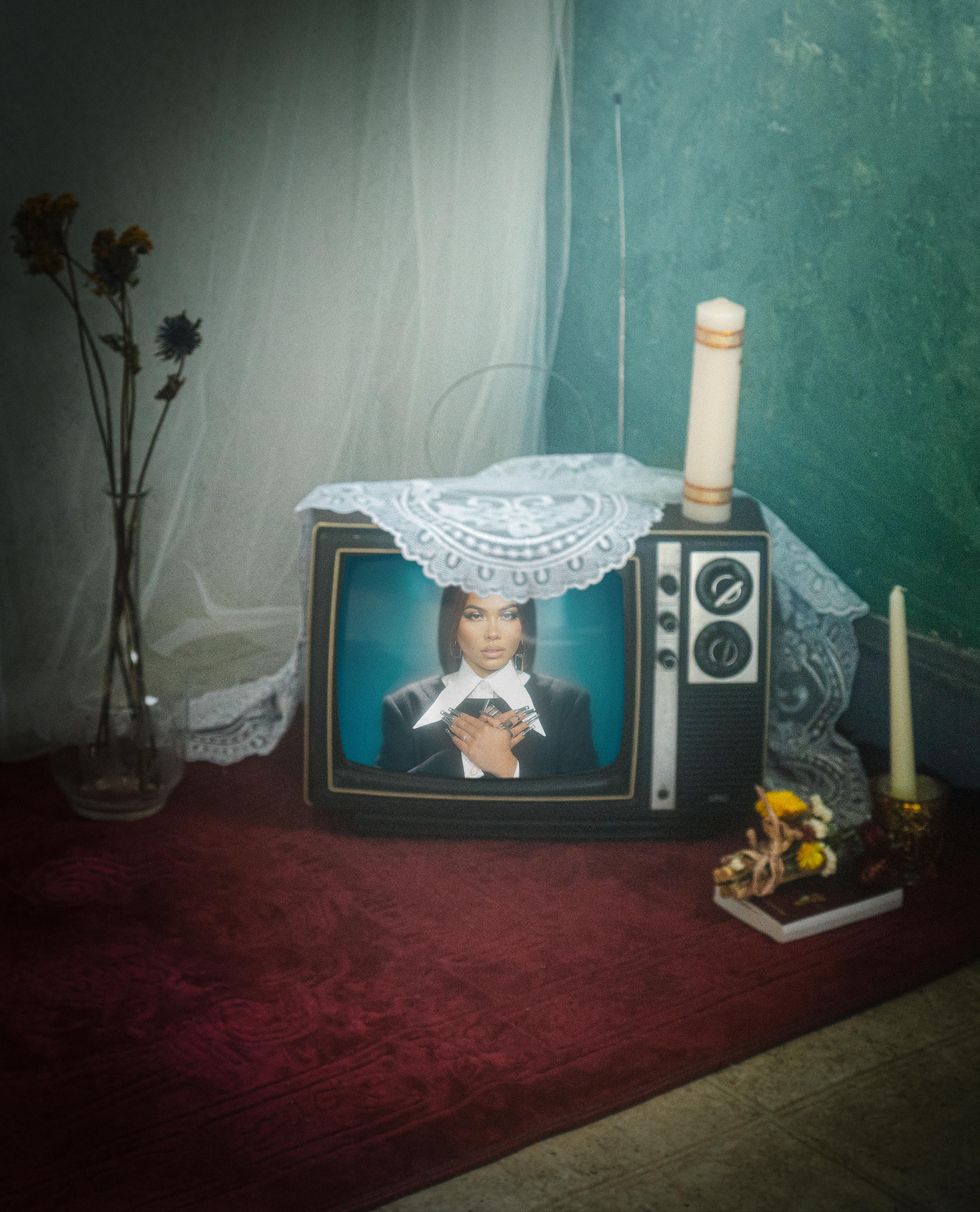
I really love how you explore that middle ground of dealing with mental health issues and depression. It's okay to feel guilty, ashamed, sad and confused.
Yeah, I think there's a lot of shame. When you're dealing with mental health and dealing with depression and anxiety, there's a lot of shame that comes into play where you don't — I remember writing "underground" and being terrified to put those words onto a piece of paper because it meant that they were true. That happens with a lot of things. Once you actually speak it, it's like, "Oh, shit, that's real. That's what I feel like. I am really depressed," or, "Oh my god, like, I really don't know where to turn."
Even when I wrote "Girls Like Girls!" Or with "flicker start" for example, it's like, where do I go? What do I do? I know I need something, but I don't know what that is. It's really scary to acknowledge and admit that. It's hard. And so I try to do that and challenge myself to do that. I'm obviously, in certain areas, very confident. But there are other areas that I really struggle in. Music is a really powerful thing. What I've learned in my journey is if I'm doing something that makes me feel uncomfortable, it's probably something that I should explore. I've just kind of learned that through that vulnerability, on the other side is freedom and acceptance and growth.
When was the last time you purposefully made yourself uncomfortable?
Every day, I mean, even just having a conversation with a stranger right now! And continuing the conversation. I can easily end a conversation. My girlfriend could literally talk to a brick wall and keep it going. I've been trying to practice continuing those conversations. Even on an everyday basis, I try to challenge myself in those ways. I'm planning a headlining tour that's very vulnerable. I hope people will come. As an artist, you're always like, "I hope people care. And I hope people want to be there and share that experience with me." Everything I do in my career is really scary. Even when announcing the Girls Like Girls novel, I was hoping that people are excited and they're looking forward to something that means so much to me. Anything that means so much to you, when you share it with someone, it's scary.
What can you tell me about your novel?
Well, I can't really say much, because we haven't really announced anything, but it's essentially a novelization of my song and video. I really wanted to expand the worlds that these two girls live in and build out their love story on the page. It's been such an incredible creative endeavor, and I have a lot to say about it, which you will hear more about. A lot of it comes from my personal experience, and so these characters are experiencing a lot of things that I experienced. It was very therapeutic and so much fun to build this world beyond the music video, which I've been wanting to do since its inception. My fans know that I obviously want to make it into a feature film and direct it. That's my dream. But the book felt like something that was tangible and something that I could do now, so I'm really excited for everyone to read it. I think they're gonna love it.
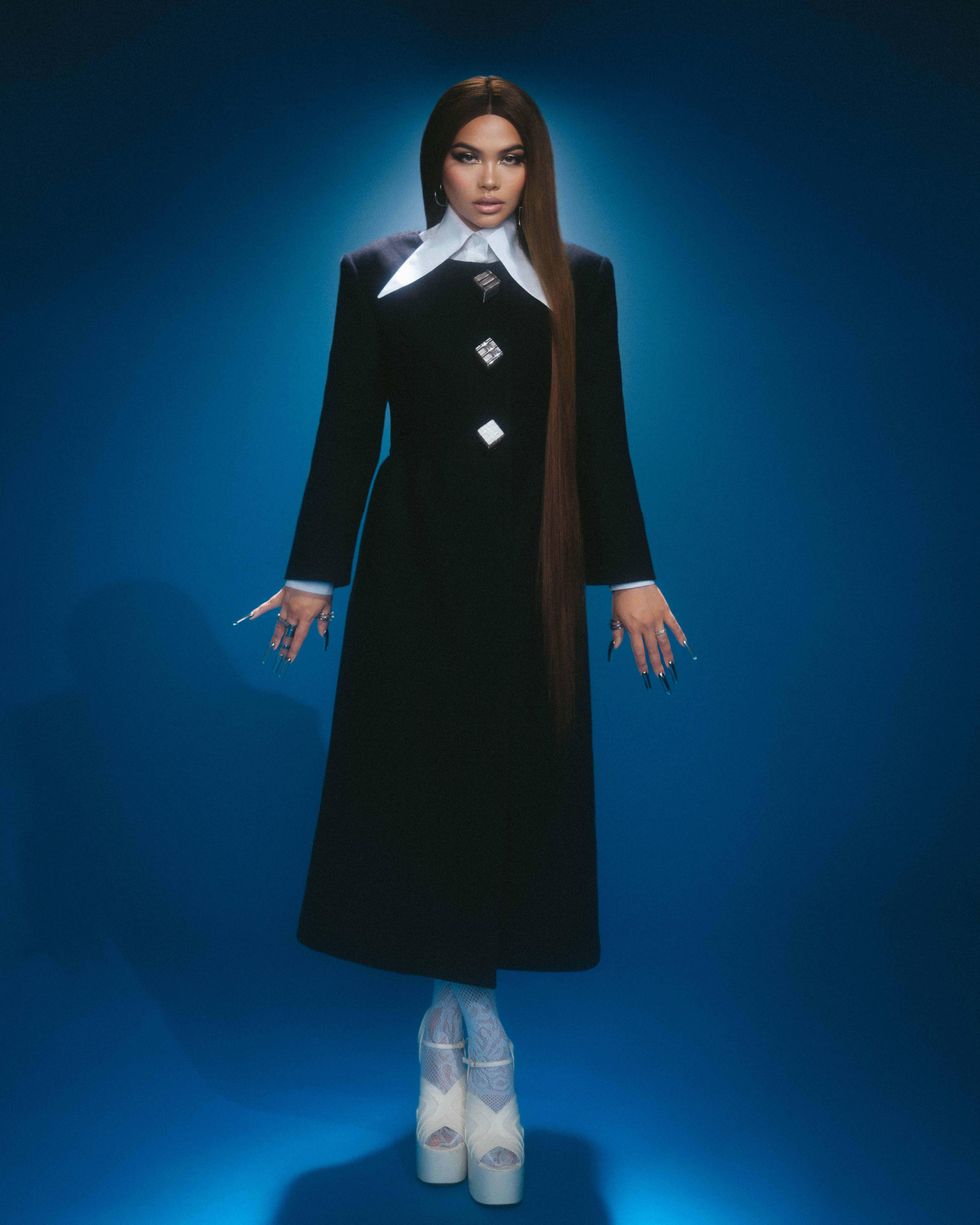
Coat, shirt and shoes: Gucci, Earrings: Heaven by Marc Jacobs, Rings: Jack Eller and Alexander McQueen, Tights: Wolford
If you don't mind me asking, what was your first relationship with a girl like?
Well, that's a complicated question. Because the "Girls Like Girls" music video was inspired by this relationship that I had in high school—
I feel like we are going to have similar stories because my first relationship with a girl was complicated since we weren't really dating, but we were?
Yeah! It was a relationship, but it wasn't because it was never discussed. [Laughs] We'd hold hands, hands on the thigh, the whole thing. I went to pursue it And she gaslit me and it was like a little thing. But yeah, I mean, I had a lot of complicated experiences with girls growing up. I'm very grateful to be in a healthy relationship with a woman that I love very much, because to get to that point, as my fans know through my lyrics on "Curious" and "sugar at the bottom," I kept getting myself in situations that did not serve me. Like, I just was so desperate to be loved and to be validated. I think you have to learn that's just part of life. You have these experiences, and you go, "I deserve a lot better," and then you eventually find your person.
Tell me about Becca. You two confirmed your relationship recently after quietly dating.
I wouldn't say quietly. I'm very open and public. We just chose not to share our relationship on the internet.
It must be sad and weird that people have asked why you chose to keep such an intimate part of your life—
Why we kept our relationship private? [Laughs] Like why wouldn't we? You know?
Yeah, I know. It's very weird. We live in a very interesting time where it was shocking that we would do that, but I'm really glad we did. It's been great and I'm grateful that people know too and it's great. I feel like everyone deserves to do whatever they want if they're in the public eye. I think that's what I learned. I was a little triggered by my past because I had been in relationships where I was hidden. I've been in a lot of situations where I had to pretend to not be with that person.
The word "hidden" is very different from "private," so at first, I was like, "What does this mean if we're not going to share it with the world?" Then I realized she loves me, and she's proud of me and we're just going to keep this for ourselves and see where this goes. And that's okay! Being a patient and understanding partner is really important for relationships to really have a good foundation. It's rare that people are shocked that we kept it private. But I'm also really grateful for the love and the support. And I've always been vulnerable with people. But, going back to your question, I also like to keep things for myself as well.
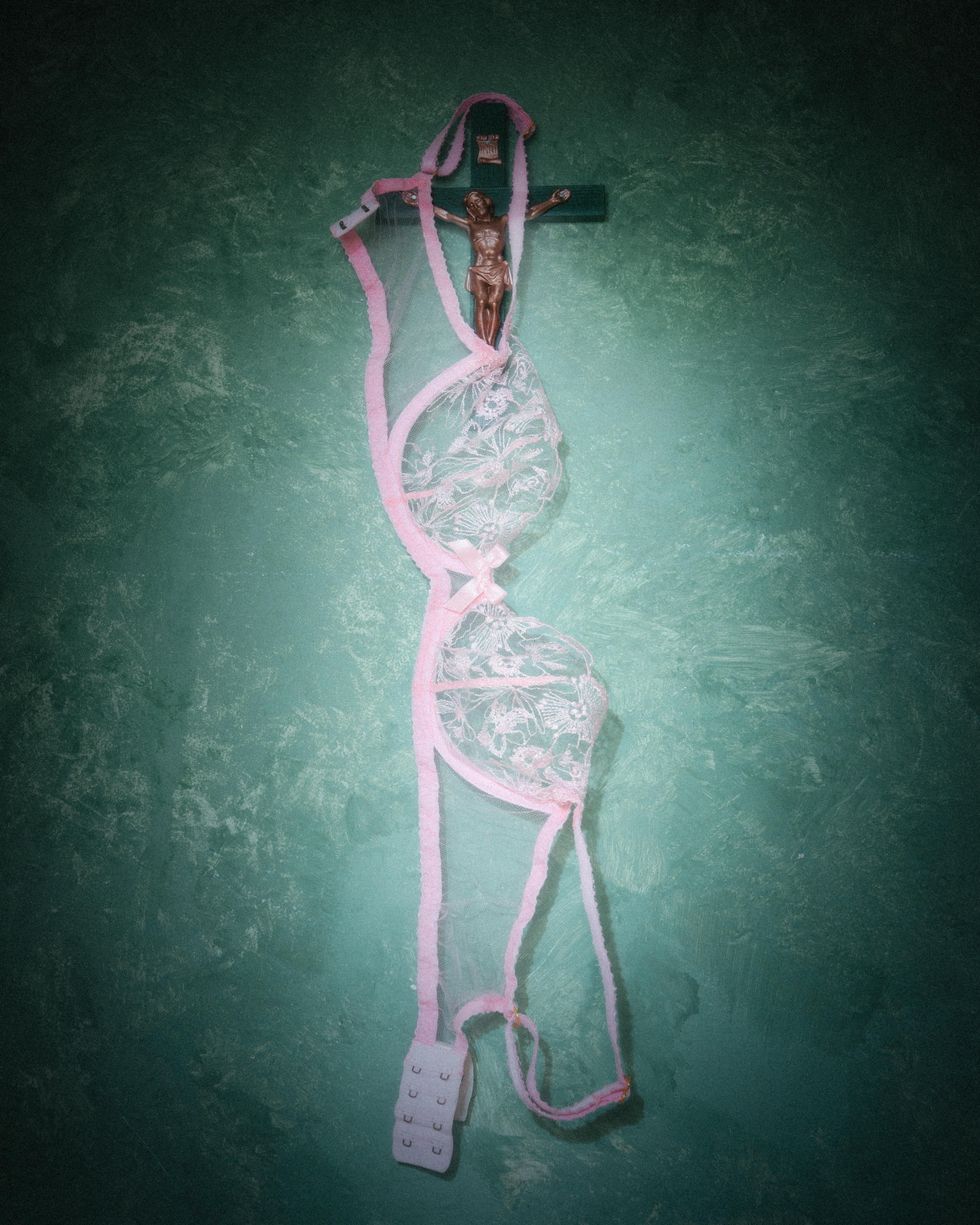
It also goes back to that shame discussion we had earlier. Do you feel like part of that instinct to share comes from wanting to prove that you are gay enough, whatever the hell that may mean?
Or like proving you're worthy. I've never had an issue where I had to prove that I was gay enough, but because I'm gay, I relate to that statement because I was like, "Why? Why do I need to share my relationship? What's the core?" I do think there was a certain point in my life where I wanted to be able to share that because I wanted to prove that I could have a girlfriend. It's just so much deeper than that when you have a wonderful love and partner. It's just a different thing.
So let's talk about the title of "Lesbian Jesus" you've adopted. How did that even come about?
I don't know which fan is going to claim that they created it. I'm not sure I know. There's probably one fan that is responsible for this. Come forward soon! I remember being at a meet and greet on tour for Expectations and they were calling me Lesbian Jesus. And I was like, "Haha, you're Lesbian Jesus!" I thought it was a thing that people were calling each other like "dude" or "bro". We're calling each other Lesbian Jesus now. Okay, cool. And then I got on Twitter and saw people responding from the meet and greet being like, "No, you're Lesbian Jesus." It just never died. It just continued to grow into this fandom and now that's what people call me sometimes, besides Hayley.
What do you think are the expectations of Lesbian Jesus?
I don't want to set myself up for failure there. I don't know exactly. What I really want is to do an interview with fans and I want them to answer all these questions about what Lesbian Jesus means to them andwhat their expectations are. We should do a follow-up interview, I think that would be cool! People ask me that all the time.
I think the connection that I've been able to understand is, you know, on tour, and just with music, it's very important to create a safe space. And when we feel safe, we can truly be our authentic selves. When we feel like our authentic selves, we have confidence and love for ourselves, and compassion. It's a ripple effect. I think that the Lesbian Jesus goes hand-in-hand with creating a safe space. I would say my expectations for myself, as someone who has been called Lesbian Jesus, would be to create safe spaces for people to be themselves.
Is there a Lesbian God?
I don't know. Maybe we haven't met Lesbian God yet?
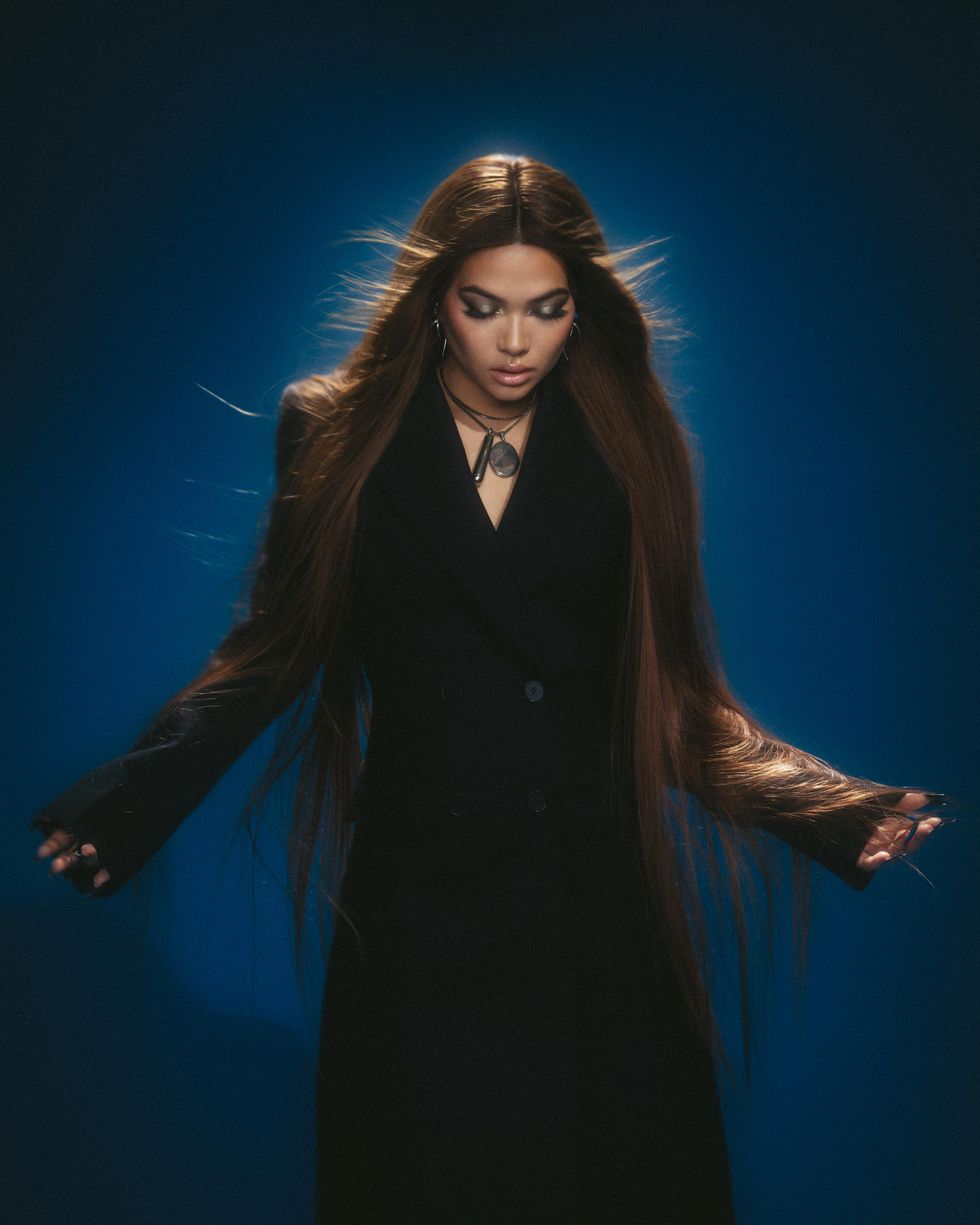
Clothing and accessories: Alexander McQueen
Photography and creative direction: Grace Scuitto
Makeup: Marla Vazquez
Hair: Abraham Esparza
Nails: Alyssa Mexy
Styling: Heather Picchiottino
Set design: Crystal Geller and Raquel Smith
Photo assistance: Shaun Mendiola
Style assistance: Savannah Yarbrough and Lucy Sylvester
Production assistance: Malia Sine
Editor-in-chief: Justin Moran
Editorial producer: Alyson Cox